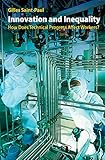Innovation and Inequality : How Does Technical Progress Affect Workers? / Gilles Saint-Paul.
Material type: TextPublisher: Princeton, NJ : Princeton University Press, [2008]Copyright date: ©2008Edition: Course BookDescription: 1 online resource (208 p.)Content type:
TextPublisher: Princeton, NJ : Princeton University Press, [2008]Copyright date: ©2008Edition: Course BookDescription: 1 online resource (208 p.)Content type: - 9780691128306
- 9781400824779
- online - DeGruyter
- Issued also in print.
| Item type | Current library | Call number | URL | Status | Notes | Barcode | |
|---|---|---|---|---|---|---|---|
 eBook
eBook
|
Biblioteca "Angelicum" Pont. Univ. S.Tommaso d'Aquino Nuvola online | online - DeGruyter (Browse shelf(Opens below)) | Online access | Not for loan (Accesso limitato) | Accesso per gli utenti autorizzati / Access for authorized users | (dgr)9781400824779 |
Browsing Biblioteca "Angelicum" Pont. Univ. S.Tommaso d'Aquino shelves, Shelving location: Nuvola online Close shelf browser (Hides shelf browser)

|

|

|

|

|

|

|
||
| online - DeGruyter Poverty Knowledge : Social Science, Social Policy, and the Poor in Twentieth-Century U.S. History / | online - DeGruyter The Corruption of Angels : The Great Inquisition of 1245-1246 / | online - DeGruyter Reinventing Justice : The American Drug Court Movement / | online - DeGruyter Innovation and Inequality : How Does Technical Progress Affect Workers? / | online - DeGruyter Tocqueville between Two Worlds : The Making of a Political and Theoretical Life / | online - DeGruyter Kingdom of Children : Culture and Controversy in the Homeschooling Movement / | online - DeGruyter Democracy and the Foreigner / |
Frontmatter -- Contents -- Introduction -- 1 Which Tools Do We Need? -- 2 Productivity and Wages in Neoclassical Growth Models -- 3 Heterogeneous Labor -- 4 Competing Technologies -- 5 Supply Effects -- 6 Labor as a Quality Input: Skill Aggregation and Sectoral Segregation -- 7 The Economics of Superstars -- 8 Complementarities and Segregation by Skills -- 9 Demand Effects -- 10 Nonhomothetic Preferences and the Distributive Effects of Innovation and Intellectual Property -- Epilogue -- References
restricted access online access with authorization star
http://purl.org/coar/access_right/c_16ec
Karl Marx predicted a world in which technical innovation would increasingly devalue and impoverish workers, but other economists thought the opposite, that it would lead to increased wages and living standards--and the economists were right. Yet in the last three decades, the market economy has been jeopardized by a worrying phenomenon: a rise in wage inequality that has left a substantial portion of the workforce worse off despite the continuing productivity growth enjoyed by the economy. Innovation and Inequality examines why. Studies have firmly established a link between this worrying trend and technical change, in particular the rise of new information technologies. In Innovation and Inequality, Gilles Saint-Paul provides a synthetic theoretical analysis of the most important mechanisms by which technical progress and innovation affect the distribution of income. He discusses the conditions under which skill-biased technical change may reduce the wages of the least skilled, and how improvements in information technology allow "superstars" to increase the scale of their activity at the expense of less talented workers. He shows how the structure of demand changes as the economy becomes wealthier, in ways that may potentially harm the poorest segments of the workforce and economy. An essential text for graduate students and an indispensable resource for researchers, Innovation and Inequality reveals how different categories of workers gain or lose from innovation, and how that gain or loss crucially depends on the nature of the innovation.
Issued also in print.
Mode of access: Internet via World Wide Web.
In English.
Description based on online resource; title from PDF title page (publisher's Web site, viewed 30. Aug 2021)


